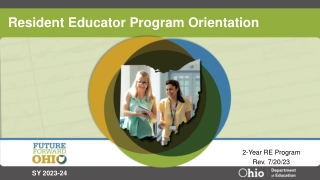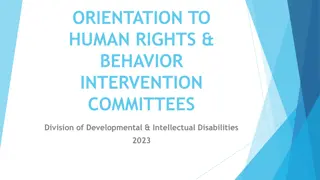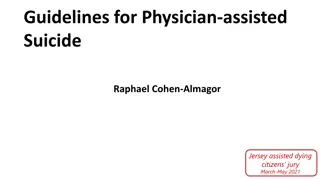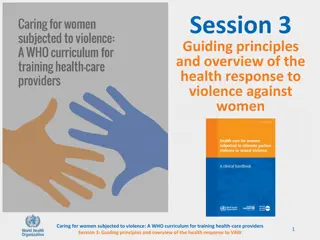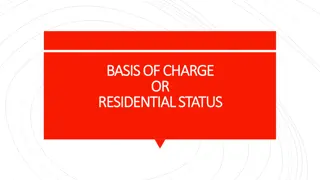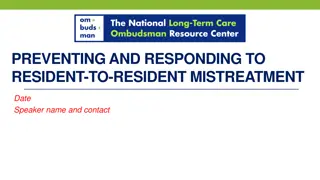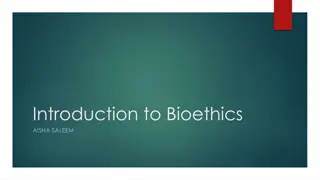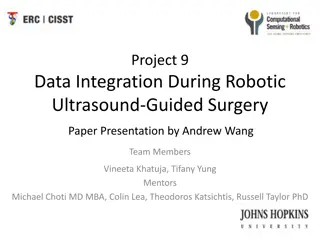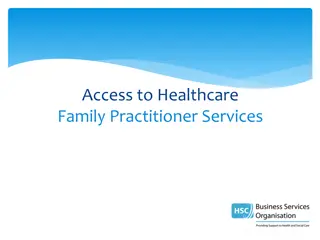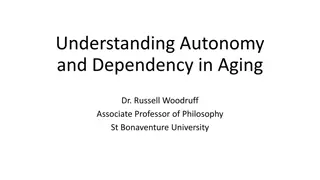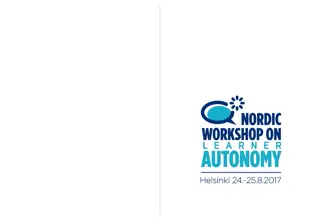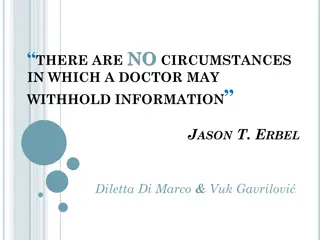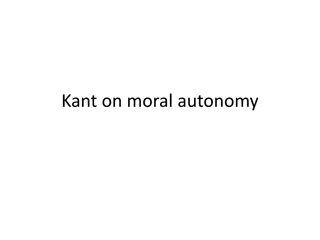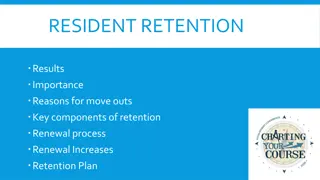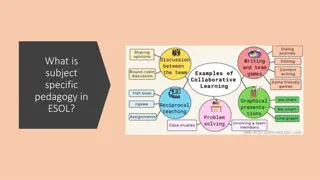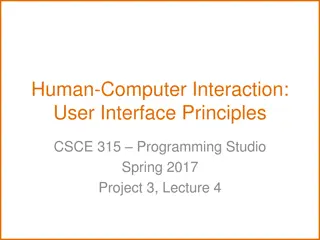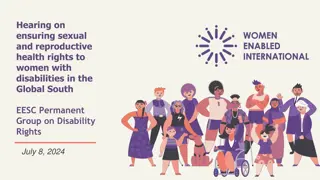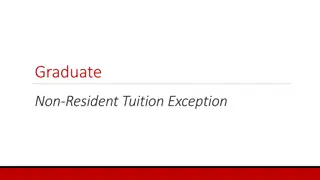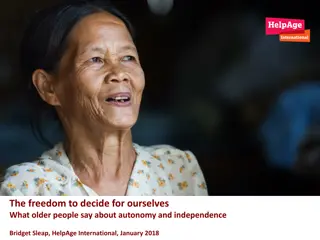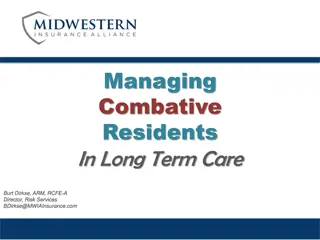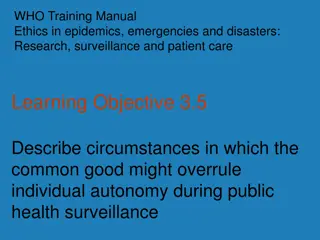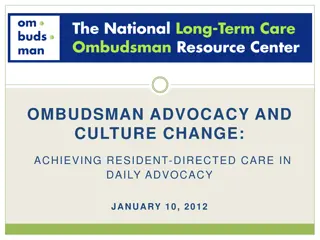Rescue Drone: Increasing Autonomy and Implementing Computer Vision
Focuses on developing a rescue drone with increased autonomy and implementing computer vision for advanced object detection. The team, consisting of Cody Campbell (Hardware Engineer), Alexandra Borgesen (Computer Engineer), Halil Yonter (Team Leader), Shawn Cho (Software Engineer), Peter Burchell (M
78 views • 44 slides
Resident Educator Program Orientation
This orientation program provides information on the Ohio Resident Educator Program, including topics such as teacher residency and induction programs, mentoring principles, and the Resident Educator Summative Assessment (RESA). It also discusses the different types of Resident Educator Licenses and
1 views • 26 slides
EU Strategic Autonomy in a Shifting Global Landscape
The European Union (EU) is strategically positioning itself for the future amidst rising global trends, such as the continued economic and geopolitical ascendancy of Asia, technological advancements, and geopolitical tensions. With initiatives like the Open Strategic Autonomy (OSA), the EU is focusi
1 views • 6 slides
Empowering Teachers: Autonomy, Agency, and Accountability in the Teaching Profession
The significance of teachers in education is highlighted, emphasizing autonomy, agency, and accountability. The role of teachers in student learning outcomes and the global agenda for teacher empowerment and quality education is discussed.
0 views • 37 slides
Navigating Decision Making and Autonomy in Adolescence
Explore the journey towards autonomy and decision-making in adolescence, including considerations of personal responsibility, influences on choices, and the impact of newfound responsibilities. Delve into practical examples, like evaluating job decisions and facing new responsibilities, to develop g
4 views • 9 slides
Ensuring Rights and Community Living for Medicaid-funded Home-Based Services
The Home and Community Based Services Settings Rule under Medicaid ensures individuals receiving services have full access to community living benefits, including autonomy, privacy, dignity, and choice in decision-making. The rule emphasizes person-centered planning, integration with the community,
0 views • 23 slides
Guidelines for Physician-Assisted Suicide: Ensuring Patient Autonomy and Safeguards
In the context of physician-assisted suicide, it is crucial to uphold patient autonomy while implementing strict safeguards to prevent abuse. Key considerations include competency, voluntariness, pressure-free decision-making, cooling-off periods, second opinions, and ensuring physician independence
3 views • 26 slides
Session 3: Guiding Principles and Overview of Health Response to Violence Against Women
This session discusses the guiding principles for caring for women subjected to violence, focusing on respect for human rights and promotion of gender equality. It covers topics such as autonomy, freedom from fear and violence, and providing support that respects women's autonomy and dignity. Emphas
0 views • 26 slides
Understanding Residential Status for Income Tax Purposes
Tax is levied on the total income of an individual based on their residential status as per the Income-tax Act, 1961. The Act classifies assessable persons into Ordinary Resident, Resident but not Ordinarily Resident, and Non-Resident. Residential status is determined by the physical presence of an
0 views • 26 slides
Understanding Ethics in Research: Principles and Major Issues
Ethics in research is crucial for ensuring the well-being of participants and upholding moral principles. Key aspects include beneficence, respect for autonomy, informed consent, and freedom from harm. Major ethical issues involve informed consent, beneficence, respect for anonymity and confidential
5 views • 18 slides
Understanding Normal Human Microbiota and Its Role in Health
Normal human microbiota refers to the microorganisms residing on our skin and mucous membranes, playing vital roles in digestion, immunity, and protection against pathogens. They are categorized into resident and transient groups, with resident flora aiding in maintaining health by synthesizing nutr
0 views • 28 slides
Preventing and Responding to Resident-to-Resident Mistreatment in Long-Term Care Facilities
Resident-to-resident mistreatment (RRM) in long-term care settings can cause physical and psychological distress to residents. This presentation covers the definition of RRM, practical solutions for prevention, the importance of individualized care, and reporting procedures. Examples of RRM include
0 views • 27 slides
Exploring Bioethics: Principles and Applications
Ethics is the foundation of bioethics, a field that delves into the ethical considerations surrounding biological and medical practices. From understanding the essence of ethics to applying principles like respect for autonomy and justice, bioethics navigates complex decisions such as allocating a s
0 views • 12 slides
Long-Term Care Regulation Provider Meeting Overview 2016
Long-term care regulation provider meeting in 2016 covered key scenarios like releasing or refusing readmission of residents, inability to meet resident needs, improved resident health, safety and health concerns, resident payment failures, and facility closure. Documentation requirements from physi
0 views • 23 slides
Admission, Transfer, and Discharge Guidelines for Virtual Resident Family Action Council
Explore essential information on admission procedures, rights, services, and practitioner affiliations for Virtual Resident Family Action Council members. Understand the materials you should receive, refund and bed hold policies, assessments, and resident rights. Be informed before signing any agree
0 views • 52 slides
Examination of Free Will and Individual Autonomy in "Whose Life is it Anyway?" by Brian Clark
The play "Whose Life is it Anyway?" by Brian Clark delves into the complex debate of free will and individual autonomy versus authority and bureaucracy in the context of healthcare. Ken Harrison, paralyzed from the neck down, challenges the medical profession and explores the limits of personal free
1 views • 14 slides
Robotic Ultrasound Integration for Surgeon Autonomy in Surgery
This paper presentation by Andrew Wang's team focuses on the data integration during robotic ultrasound-guided surgery. The project proposes the integration of live ultrasound feed and an image browser to view saved ultrasound images, along with the ability to construct 3D models of organs using pre
0 views • 22 slides
Understanding Access to Healthcare in Northern Ireland
Access to healthcare services in Northern Ireland is crucial for the well-being of residents and eligible visitors. Family Practitioner Services play a significant role in providing advice, training, and verification for entitlement to publicly funded healthcare. The main legislation, including the
0 views • 19 slides
Understanding Citizenship Through Aristotle's Four Aspects
Aristotle's concept of citizenship involves balancing individual autonomy, participation in public affairs, state authority, and social relations. A 2004 survey explored different dimensions of citizenship like participation, autonomy, adherence to social order, and solidarity. The data from the sur
0 views • 15 slides
Understanding Autonomy and Dependency in Aging
This content explores three conceptions of aging - chronological, biological, and psychosocial aging - and their impact on autonomy and dependency in older adults. It discusses how individuals age differently biologically and psychologically and examines the significance of interpreting and respondi
0 views • 20 slides
Dive into the Autonomy Earnings Management Case
Unveil the intricate web of deceit in the Autonomy earnings management scandal involving inflated revenues, orchestrated schemes, and high-profile executives. Discover how the SEC uncovered the fraudulent practices leading to legal actions against key figures like CEO Michael Lynch and CFO Sushovan
0 views • 25 slides
Language Learner Autonomy Conference Programme Overview
The Language Learner Autonomy Conference spans three days full of insightful presentations, workshops, and discussions focusing on fostering learner autonomy in multilingual environments. The event includes diverse topics such as identity, social learning spaces, and empowering learners through embo
0 views • 14 slides
Overview of the French Education System: Historic Perspectives, Main Steps, and Governance
Historic perspectives trace the evolution of the French Education System from private to public and secular. The main steps outline compulsory education stages from nursery to high school and higher education. The system is structured around freedom, centralization, and autonomy principles, with mor
0 views • 14 slides
Ethical Considerations in Doctor-Patient Communication
The debate on whether a doctor should withhold information from a patient revolves around the principles of autonomy versus beneficence. Various ethical viewpoints such as utilitarianism, libertarianism, Kantian moral imperatives, and Aristotelianism are explored. While some argue for disclosing all
0 views • 25 slides
Kant on Moral Autonomy: Insights on Duty and Inclination
Immanuel Kant emphasizes the significance of moral freedom and autonomy, highlighting the superiority of acting out of duty over mere inclination. He asserts that a good will is inherently valuable, irrespective of consequences or external motivations. Kant distinguishes between actions driven by du
0 views • 21 slides
Understanding Consent and Body Autonomy for Children
Learn about the importance of consent, body autonomy, and listening to one's instincts through real-life scenarios and educational resources. Empower children to assert their boundaries and understand the concept of personal space in a respectful manner.
0 views • 12 slides
Promoting School Autonomy in Centralized Structures: Implications for Policy Borrowing
Centralized educational structures face implications when promoting school autonomy. Policy borrowing highlights the need for change, initiation of educational policies, and international differences in implementation. The benefits and costs of buying in a shop versus going to a tailor parallel the
0 views • 26 slides
Balancing Sustainable Development and Open Strategic Autonomy in the European Union
The European Union is navigating the challenge of promoting sustainable development while pursuing open strategic autonomy. President von der Leyen's leadership has driven ambitious sustainability policies like the European Green Deal. The 2023 Strategic Foresight Report emphasizes the intertwined n
0 views • 7 slides
Ethical Dilemmas in Healthcare: Autonomy vs. Intervention
The scenarios presented raise complex ethical questions in healthcare. The first involves a dancer refusing life-saving surgery, leading to a controversial intervention. The second explores euthanasia for a terminally ill patient. These situations challenge notions of autonomy, consent, and the righ
0 views • 15 slides
Enhancing Resident Retention Strategies for Property Managers
Explore the importance of resident retention, key components of successful programs, reasons for move-outs, and ways to improve retention rates. Learn how to create a welcoming environment, utilize customer service, enhance maintenance follow-ups, and boost resident satisfaction to stabilize propert
0 views • 15 slides
Understanding ESOL Pedagogy: Subject-Specific Approaches and Principles
ESOL pedagogy involves subject-specific pedagogy, pedagogical knowledge, content knowledge, and sequencing the curriculum. It focuses on making learning topics comprehensible, utilizing students' understandings, and promoting learner autonomy. The underlying principles include activating prior learn
0 views • 11 slides
User Interface Design Principles in Human-Computer Interaction
User interface design principles are crucial in Human-Computer Interaction. This content highlights key principles such as aesthetics, anticipation, autonomy, and color consideration for users with color blindness. It emphasizes the importance of user testing, user autonomy, and providing essential
0 views • 24 slides
Challenges in Ensuring Sexual and Reproductive Health Rights for Women with Disabilities in the Global South
Women with disabilities in the Global South face barriers such as lack of information, inaccessible services, and denial of bodily autonomy in accessing sexual and reproductive health rights. Initiatives like the Community-Based SRH Officers Programme aim to empower individuals with disabilities to
1 views • 10 slides
Ethics and Values in Counselling and Psychotherapy
The field of counselling and psychotherapy is guided by key values, ethical principles, and professional standards aimed at respecting human rights, enhancing relationships, and promoting personal well-being. Recent developments, such as the potential introduction of statutory regulation, highlight
0 views • 19 slides
Graduate Non-Resident Tuition Exception Form Overview
Explore the Graduate Non-Resident Tuition Exception Form, an online tool for submitting requests for non-resident tuition waivers. This comprehensive guide covers the form's structure, pre-populated sections, requester and student information input, funding request details, and the submission proces
0 views • 23 slides
Perspectives on Autonomy and Independence in Older Age
Understanding the perspectives on autonomy and independence in older age, as shared by individuals from 24 countries through a consultation conducted by various organizations. Older people express the importance of making their own decisions, the impact of health on independence, challenges in maint
0 views • 13 slides
Managing Combative Residents in Long-Term Care
Residents in long-term care facilities may exhibit combative behaviors due to underlying psychiatric conditions, cognitive impairment, or dementia. This aggression poses challenges for both staff and other residents. Caregiver training is crucial for identifying triggers and managing combative episo
0 views • 17 slides
Balancing Individual Autonomy and Public Health in Surveillance
Public health measures such as surveillance, notification, mandatory testing, and isolation may conflict with individual autonomy. Respecting autonomy is crucial for promoting well-being, but there are situations where overriding individual autonomy is necessary for the common good of society during
0 views • 15 slides
Nordic Government Perspective on Autonomy and Values in Higher Education
Agneta Bladh, a former Rector and State Secretary in Sweden, discusses the importance of autonomy and values in the higher education systems of Nordic countries. She explores the role of the state as a guardian, different types of autonomy, restrictions, arguments for and against larger autonomy, an
0 views • 13 slides
Transforming Long-Term Care: Resident-Directed Culture Change
The content discusses the crucial shift towards resident-directed care in long-term care facilities through culture change practices, emphasizing person-first language, resident empowerment, and system improvements. It explores the philosophy, practices, and language adaptations necessary to enhance
0 views • 31 slides

